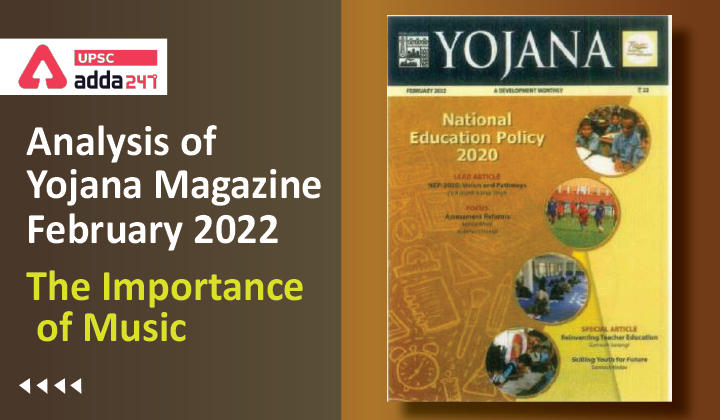Table of Contents
Analysis of Yojana Magazine: The Importance of Music
GS 1: Indian Music, GS 2: Education, Issues Relating to Development
Introduction
- According to NEP 2020, initiatives must begin at the pre-primary and continue through higher education for exposing the students to Indian music, arts, crafts and languages.
- As this cultural and natural wealth truly make India, “Incredible India!”
Why Indian Music is Important as an Academic Discipline?
- Every child in our country has the right to get exposed to classical music and other art forms.
- Early exposure to classical music during their school years becomes helpful when a child is receptive and their sensitivities are developing.
- Many researchers and music practitioners from the western world are also in awe of our music.
- The music slows down the conflicts and disputes.
- Expressing through music enables children to develop emotional stability and harmony.
- If music becomes a discipline the child can pursue higher studies, which can prove to be beneficial for them as music learning at this stage can be linked with college education.
- Improvisation in music offers unlimited capacity and opportunities for improvement which can encourage the students to constantly push the limits and do better, thus helping in the development of the brain, sensitivities, and formation of human connections.
Music as an Established Subject
- Music should be encouraged and included in schools and colleges as a mainstream subject.
- ‘Music’ and ‘Culture’ have an inherent quality of engaging.
- Indian classical music and our age-old art forms offer benefits to children way beyond entertainment which often go unnoticed.
- Students who engage themselves in music and devote more time to learning and practicing it indulge less in non-productive activities such as watching screen for longer hours.
- The advantages of music are extensive and far-reaching and do not lead up to any child’s race, ethnicity, or social background.
What do Data say?
- Music education from a young age has proved to be a well-founded predictor of success in higher education and professional life as well.
- According to the records, the first-rate engineers and technical designers in Silicon Valley in the US along with a large number of students studying at the IITs, IIMs, I1SERs, I1Scs, and many other top colleges and universities in India are practising musicians.
- Let us not fail to remember that Albert Einstein, the greatest physicist of the late 19th_20th century was a highly skilled musician. Einstein used music as a doorway and means to dwell upon and create his significant inventions.
- Dr APJ Abdul Kalam, the former President of India had learnt to play the veena during 1985-95 when he was with the Defence Research and Development Organisation (DRDO).
Conclusion
The great violin teacher Shinichi Suzuki once said “The purpose of music education is to train children, not to necessarily be professional musicians but to be fine musicians and to show high ability in any other field they enter.” The benefits that music education offers are way beyond academic excellence and consist of no language barrier. Its applications in today’s fast-moving world are truly inspiring and liberating. Hence, music education should not only be retained in schools and colleges but should be made mandatory and not kept optional anymore.



 TSPSC Group 1 Question Paper 2024, Downl...
TSPSC Group 1 Question Paper 2024, Downl...
 TSPSC Group 1 Answer key 2024 Out, Downl...
TSPSC Group 1 Answer key 2024 Out, Downl...
 UPSC Prelims 2024 Question Paper, Downlo...
UPSC Prelims 2024 Question Paper, Downlo...
